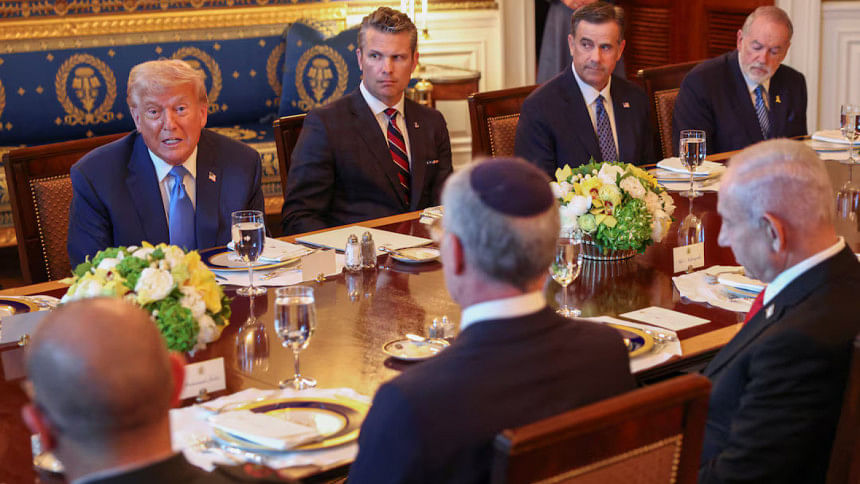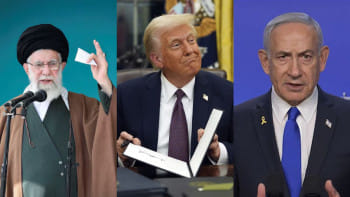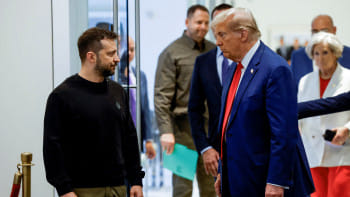The BRICS equation behind the Israel-Iran conflict

"Things fall apart; the centre cannot hold;
Mere anarchy is loosed upon the world..."
—W.B. Yeats, "The Second Coming"
Mainstream media coverage of the Israel-Iran conflict often pivots on proxies, retaliation, and regional instability. Analysts debate whether Tehran's reach into Lebanon, Syria, and Iraq crosses Israel's red lines or whether Israel's preemptive strikes serve as deterrence or provocation. But such readings obscure the deeper shift underway: the erosion of a US-led unipolar world order and the contested rise of a multipolar alternative. The latest escalation—particularly following direct US strikes on Iranian nuclear facilities based on questionable intelligence—must be understood not merely in regional terms but as part of Washington's broader effort to derail BRICS+ and the geopolitical realignment it symbolises.
Between 2024 and 2025, BRICS expanded, joined by countries including Iran, the UAE, Egypt, and Ethiopia as members, and Vietnam as a partner country. BRICS+ now represents 44 percent of global GDP (by purchasing power parity) and 56 percent of the world's population. What began as a rhetorical coalition has matured into a formidable bloc with institutional ambitions. Of late, Washington's renewed push to finalise a trade and security agreement with Vietnam is no coincidence. There is a method in the apparent madness: fragment BRICS from within, contain China's influence, and reassert US leverage over strategic trade routes and supply chains. In this light, the Israel-Iran conflict is not an isolated flashpoint but a calculated disruption—part of a wider effort to arrest the momentum of multipolarity before it takes structural root.
BRICS—initially Brazil, Russia, India, China, and South Africa—was long dismissed in the West as rhetorical. But in recent times, it has begun building parallel institutions to challenge Western dominance.
Among its most ambitious aims is de-dollarisation—reducing global dependence on the US dollar in trade and finance. This strikes at the foundation of America's economic and geopolitical power. Washington's leverage, enforced via sanctions and institutions like Society for Worldwide Interbank Financial Telecommunication (SWIFT) and the IMF, is deeply rooted in the dollar's primacy. Iran's BRICS accession, therefore, is not symbolic; it is strategic. It signals a path for sanctioned states to break free from the architecture of Western economic coercion.
Long the poster child of US sanctions, Iran has survived through creative oil trade mechanisms and strategic ties with Russia and China. But BRICS membership gives Iran more than endurance—it grants legitimacy. With the option to trade outside the dollar system—especially with China, India, or Gulf economies—Iran gains leverage and economic insulation.
Equally important, BRICS offers a diplomatic umbrella. Tehran can now reframe itself not as a pariah, but as a pillar of Global South resistance to neocolonial order. And here lies the paradox for Washington: the more it tries to isolate Iran, the more it risks binding BRICS members closer together in mutual defiance.
Israel, while not a BRICS member, plays a pivotal role in defending US hegemony. Beyond being a regional ally, it serves as a forward base to project US power and trial strategies of containment in the Middle East, especially towards Iran.
Israel's targeted assassinations and airstrikes, often justified as preemptive defence, also serve a larger agenda: to provoke Iran into retaliating, thereby justifying its continued isolation and obstructing its integration into blocs like BRICS. The April 2024 assassination of high-ranking Iranian commanders in Damascus underscores this logic. It wasn't just a tactical strike; it was a disruption of diplomacy itself.
Netanyahu's rhetoric—essentially issuing his own "fatwa" for regime change in Iran, echoed theatrically by Trump—reflects not confidence but desperation. The strategy is no longer about negotiation or deterrence but elimination. It is an attempt to stall the rise of a post-American global order.
The inclusion of Iran and major Gulf oil exporters into BRICS ruptured the illusion that US military and financial patronage ensured alignment. These states signalled an interest in diversifying their strategic options, posing a fundamental threat to American global dominance.
This is why the Israel-Iran conflict now functions as more than a regional war. It is a disruption tactic, driving wedges into BRICS. The UAE and Egypt—though now members—remain heavily reliant on US defence systems. A full-scale conflict involving Iran forces these countries into a dilemma: support BRICS cohesion or retreat into the safety of US patronage.
The most recent flare-up began with Israeli strikes on Iran's nuclear sites. Lacking the munitions needed to breach Iran's fortified facilities, Israel's campaign faltered until the US intervened with bunker buster bombs. This joint assault shattered the myth of Israeli self-sufficiency and signalled Washington's readiness to escalate beyond deterrence.
It also sends a chilling message to the Global South: efforts to create alternative global alignments will be met not just with economic sabotage, but with deliberate destabilisation. The US is signalling that the cost of challenging unipolarity is not merely financial, it is existential.
The Israel-Iran conflict is not simply about borders or nuclear enrichment; it is about who defines global legitimacy. For Washington, the goal may not be to "defeat" Iran outright but to bog it down, thereby weakening BRICS coherence. A cornered Iran complicates unity within the bloc, keeps India cautious, China distracted, and Gulf states ambivalent.
Yet this approach is a double-edged sword. The more openly the US and Israel target Iran, the more they risk galvanising anti-Western sentiment across the Global South. The fragmentation they seek may ironically foster deeper BRICS solidarity, uniting states weary of Western double standards and coercive diplomacy.
The 2025 BRICS Summit in Rio unfolded under intense geopolitical pressure. Intended to showcase an emerging multipolar consensus—emphasising economic cooperation, peace advocacy, and systemic alternatives to US dominance—it also exposed the fragility of that project. Brazil, as host, walked a diplomatic tightrope: championing Global South solidarity while safeguarding its deep economic ties with the US and EU. The absence of China's and Russia's top leadership created a symbolic vacuum, muting the bloc's collective challenge to Western hegemony.
Nonetheless, the summit reaffirmed BRICS's ambition to contest the Western monopoly over global economic governance. Delegates condemned the resurgence of protectionism, particularly the Trump administration's unilateral tariffs—policies framed as national security measures but seen as instruments of economic coercion, reinforcing a unipolar order that subordinates trade and financial systems to US strategic interests. In response, BRICS leaders emphasised the need to build alternative institutions aligned with the priorities of the Global South. This includes expanding the New Development Bank to reduce reliance on Bretton Woods institutions, and accelerating non-dollar trade settlement mechanisms to protect against the vulnerabilities of a dollar-dominated system.
These initiatives reflect more than a rejection of Western conditionality. They assert economic agency against the weaponisation of interdependence that sustains US global influence. Yet the summit also revealed how internal divergences and external pressures—particularly military escalation in the Middle East—continue to strain BRICS's coherence. The bloc's ambition remains clear, but so too does its susceptibility to fragmentation, precisely the fault line Washington seeks to exploit.
Washington's efforts to slow the pace of multipolarity through regional destabilisation may offer short-term gains. But long-term, they risk deepening the legitimacy crisis of US leadership and driving more nations towards BRICS, not away from it.
To view this as a local flashpoint is to miss the larger stakes. This is a front line in the struggle over the future of international order. And despite its contradictions, BRICS is no longer just a symbol. It is a contender that now packs an unmistakable punch.
Dr Faridul Alam, a retired academic, writes from New York City, US.
Views expressed in this article are the author's own.
Follow The Daily Star Opinion on Facebook for the latest opinions, commentaries and analyses by experts and professionals. To contribute your article or letter to The Daily Star Opinion, see our guidelines for submission.

 For all latest news, follow The Daily Star's Google News channel.
For all latest news, follow The Daily Star's Google News channel. 










Comments